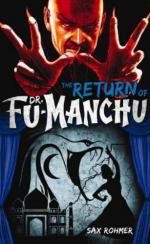A tiny, inflamed wound showed on the wrist; and a certain puffiness was becoming observable in the injured hand and arm. Smith bent down and drew a quick, sibilant breath.
“You know what this is, Petrie?” he cried.
“Certainly. It was too late to employ a ligature and useless to inject ammonia. Death was practically instantaneous. His heart . . .”
There came a loud knocking and ringing.
“Carter!” cried Smith, turning to the detective, “open that door to no one—no one. Explain who I am—”
“But if it is the inspector?—”
“I said, open the door to no one!” snapped Smith.
“Burke, stand exactly where you are! Carter, you can speak to whoever knocks, through the letter-box. Petrie, don’t move for your life! It may be here, in the hallway!—”
CHAPTER IX
THE CLIMBER
Our search of the house of Abel Slattin ceased only with the coming of the dawn, and yielded nothing but disappointment. Failure followed upon failure; for, in the gray light of the morning, our own quest concluded, Inspector Weymouth returned to report that the girl, Karamaneh, had thrown him off the scent.
Again he stood before me, the big, burly friend of old and dreadful days, a little grayer above the temples, which I set down for a record of former horrors, but deliberate, stoical, thorough, as ever. His blue eyes melted in the old generous way as he saw me, and he gripped my hand in greeting.
“Once again,” he said, “your dark-eyed friend has been too clever for me, Doctor. But the track as far as I could follow, leads to the old spot. In fact,”—he turned to Smith, who, grim-faced and haggard, looked thoroughly ill in that gray light—“I believe Fu-Manchu’s lair is somewhere near the former opium-den of Shen-Yan—’Singapore Charlie.’”
Smith nodded.
“We will turn our attention in that direction,” he replied, “at a very early date.”
Inspector Weymouth looked down at the body of Abel Slattin.
“How was it done?” he asked softly.
“Clumsily for Fu-Manchu,” I replied. “A snake was introduced into the house by some means—”
“By Karamaneh!” rapped Smith.
“Very possibly by Karamaneh,” I continued firmly. “The thing has escaped us.”
“My own idea,” said Smith, “is that it was concealed about his clothing. When he fell by the open door it glided out of the house. We must have the garden searched thoroughly by daylight.”
“He”—Weymouth glanced at that which lay upon the floor—“must be moved; but otherwise we can leave the place untouched, clear out the servants, and lock the house up.”
“I have already given orders to that effect,” answered Smith. He spoke wearily and with a note of conscious defeat in his voice. “Nothing has been disturbed;”—he swept his arm around comprehensively—“papers and so forth you can examine at leisure.”




